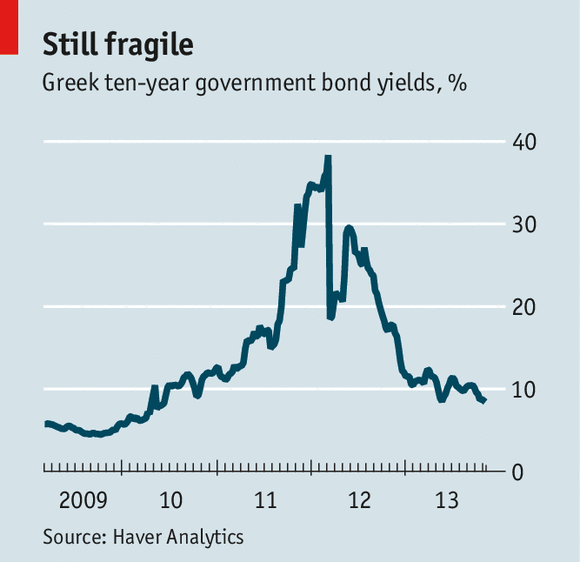Greece’s bail-out
Little respite
A hard winter lies ahead for the Greek government

Mr Samaras’s centre-right New Democracy party and its junior partner, the PanHellenic Socialist Movement (Pasok), narrowly survived a no-confidence vote in the early hours of November 11th. The motion was proposed by Alexis Tsipras, boss of Syriza, a hard-left opposition party, in an attempt to bring a fractious far-left faction of his party on board after he pledged in a speech during a trip to America that, if elected, he would not take Greece out of the euro. The coalition scraped through after a defection by a Pasok lawmaker, the sixth since last year’s general election.
The government can expect little respite. A vote on the new property tax is looming; it is unlikely to be approved by parliament in its present form. Rebel Pasok lawmakers say it should be replaced by a sweeping wealth tax, whereas New Democrats are under pressure from farmers to drop it altogether.
Greece’s creditors are turning up the heat on Mr Samaras. The “troika” of officials from the European Union, the European Central Bank and the IMF are pressing for new measures to plug a gap of about €1.5 billion ($2 billion) in the 2014 budget. The government says the shortfall is only €500m-700m and can be covered by cracking down on employers who evade paying social-security contributions. The troika is sceptical, as the finance ministry has missed all its previous targets for collecting unpaid taxes.
Mr Samaras and Evangelos Venizelos, the deputy prime minister and Pasok leader, plead that Greeks cannot take any more austerity. The timetable for structural reforms is slipping. With 4,000 civil servants due to be sacked next month, the government wants to avert more job cuts. It is fighting to keep open two heavily loss-making defence companies that the troika insists should be shut down. The coalition “just don’t want to fire anyone,” says Miranda Xafa, a former IMF official.
Talks on closing the fiscal gap will now drag into next year, say officials in Brussels. By then a new German government will be in place, which will ease decision-making. Assured of a primary budget surplus (ie, before debt repayments) and without any large bond issues to be repaid in the next few months, Greece is not in imminent danger of defaulting. But if the reform programme continues to founder, the markets’ new-found belief in a Greek recovery could quickly fade.
Gloomy Athenians are pondering the possibility of widespread political violence after the killing on November 1st of two members of Golden Dawn, a neo-Nazi party, outside its offices by a gunman who got away on a motorbike. The attack was seen as revenge for the fatal stabbing of Pavlos Fyssas, an anti-fascist rapper, by a self-proclaimed supporter of Golden Dawn. Police believe a local left-wing terrorist group is responsible. No arrests have been made. So far, said a police officer, extremists from left and right are lying low.
No comments:
Post a Comment